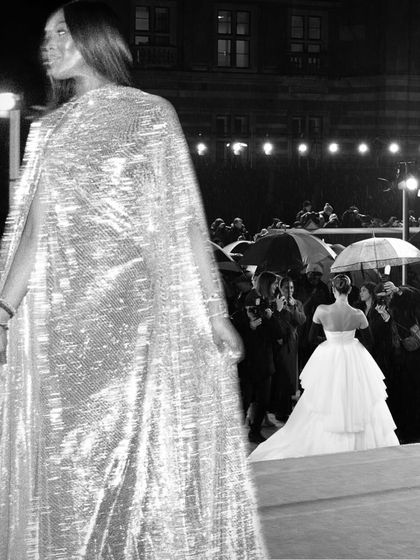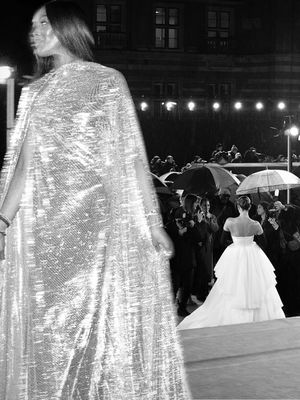

How I Made It: Caroline Rush, CEO, British Fashion Council
There’s no need to have a master plan. I never had a one for my career, but I always liked fashion. As a teenager, I presumed that I would have to go into retail if I wanted to work in the industry. I didn’t know how many other jobs there were in this business until I was in college and did a bit of modelling. I don’t like having my picture taken, so the modelling was short-lived, but it was a great way to see behind the scenes. I learnt how a campaign works and had an insight into what a design team does. In fact, that’s probably why I’ve ended up in a communications-type role. I understand the engagement a campaign aims to achieve, as well as the styling behind it.
Don’t just think about the industry you want to work in. I have friends who were also models. They’ve ended up going into buying and merchandising, and also sales – not because that’s what they always wanted to do, more because they’ve met people who’ve told them they might have the right skills for those roles. And they’ve then built fantastic careers for themselves, because their jobs reflect their personalities and skill sets. With me, I enjoy matching the creative with the business. So, think about the roles within an industry that might energise you – because you’re potentially going to be doing that job every day, and you’ll need to bring your whole personality to it.
Find something you’re really motivated to do. Drive is the thing that’s most helped me get to where I am today. I love being around creative people, and I feed off their energy and ideas, but I have an inherent drive that really makes the difference. I think that drive is something you can develop – if you’re in a career you love, and if you have the right personality. We probably all have friends who have jobs they don’t love, and their jobs are just jobs. But we also have friends who will be driven to do their best all the time, whether they’re in a particularly challenging time – like we were post-Brexit and during the pandemic – or they’re having a fantastic time, as we have after a Fashion Week’s gone particularly well, say. In fashion, you need that drive because the best opportunities are often in the more challenging times.
Celebrate the wins – in business and for yourself. This year is the 40th year of London Fashion Week and I've been asked a lot why that is important to celebrate. First, it’s an opportunity to showcase the DNA of the organisation and, in our case, the industry we represent. Why would you pass that up? Forty is also a milestone number in our society. In our lives, it’s a point when we’ve established where we’re going, and that resonates with where fashion is right now. It’s been a challenging few years – lots of businesses have had to adapt since Brexit caused a lot of problems around trading arrangements with the EU – but now there’s an opportunity for some storytelling about how the industry has met those challenges. It’s also an opportunity to try some new things, which is why the format for June’s Fashion Week will be a bit different, as we show how fashion intersects with British culture at large.
Remember, it’s often your role to let others shine. My job in all of this is simply to create the framework for others to showcase their creativity. It was the same for the 2012 Olympics. Again, because fashion is a big part of British culture, we wanted it to play a big role. Everyone remembers the closing ceremony, when all the supermodels came together, and it was so good to see fashion recognised as part of this landmark moment in British history and culture. We had lots of French guests over for February’s Fashion Week, and some of them were slightly horrified that Paris was about to be taken over. I kept telling them what a fantastic feeling there was in London during the Games.
Surround yourself with friends and in many ways, they will become your mentors. But I’ve also been very fortunate in this role to have worked with four chairs – two men, two women – who have all been incredible in different ways. Harold Tillman was a brilliant retailer and I still speak to him every week. Natalie Massenet was just a bundle of ideas and creativity. Stephanie Phair was great at giving a more commercial perspective. Today, David Pemsel is very focused on how we futureproof, having done a great job turning round the profitability of the Guardian. I have learnt a huge amount from each of them.
Just make sure you listen. I don’t mean just listening to people who have been in your industry longer than you or are maybe just older than you. I mean listen to all different perspectives. Always keep listening and learning and be willing to challenge yourself. If you’re a leader, just remember you’re still steering the ship.
Don’t have a rigid view of where you’re going as an organisation. I like to think that’s one of my strengths. I have a vision of where we should be going, and we have a strategy to get there, but I’m very aware the industry is changing constantly. That’s why I’m listening and learning all the time. Sustainability is a big learning curve at the moment, and I am also being challenged to look at diversity and inclusion. Have we done everything we can to further these things? That’s the question we’re being asked right now. Luckily, I’m surrounded by brilliant people who encourage me to push as far as I can to make the industry as open as it can be.
Take a moment to reflect on things you’ve done well. I haven’t reached this point with the 40th celebrations as they’re going on all year, but I know what it’s like. There’s so much prep, then the pressure to deliver, then the events themselves. You come into the office the morning after and you’re already asking: What did we learn? What could we do better? What’s next? It’s good to just take a moment before then, and I want to get better at that.
Find the balance between having empathy and sticking to your vision. That helps the team know where they’re going and keeps everything moving in the right direction. A good leader also makes sure they’re communicating their vision to the team. And they know when to stick to their guns and when to change something. I’ve learnt to trust my instincts on that: if something’s telling you maybe you’re not on the right path, take the time to figure out why.
Understand that your network is really a partnership with common goals. Treat everybody the same way. If you do that, you will be your authentic self, and that’s when you can solid relationships. People will always know where they stand because there will be only one version of you. My network comes into its own around events like Fashion Week, when we are encouraging people to come together and potentially do things in collaboration that don’t come naturally. If there is an underlying trust already there, getting them to do those things becomes a lot easier.
Make sure you have friends outside your industry. Fashion can be tough, with lots of travel, and that’s maybe why we can end up with friends inside the industry – they share that understanding. It’s not easy, but make sure you’re still making time for outside friends, for the little moments as well as the big ones.
Carve out time for a personal life. For me, walking my dog every day is important. It gets me outside first thing. I also have an old friend, one of my closest friends, who is a yoga therapist. She’s very good at keeping me on track, too. She lives in New York and we might not have spoken for a while, but she’ll send me a little video – it might just be a bit of grounding or breathwork – and it really helps me manage stress levels. I used to go for runs, but as I get further into my career, I realise I actually need to be de-stressing my nervous system. I do enjoy SoulCycle, though. The music and the lights ensure you can’t be thinking about your to-do list or anything else.
State your case before asking for a pay rise. Understand what’s going on in the market, and articulate where you’ve gone above and beyond in what you’ve delivered. Be mindful of your organisation’s resources, though, and pitch your pay rise accordingly. If your company has had a tough time or has limited resources, not getting what you want can create friction. Recognising your company’s position can help you find the right figure to ask for.
Finally, have an open conversation if you don’t love your job right now. A good line manager will help you build your skills, so you can go for a role you do love in the future. Good organisations don’t assume you are going to be working for them forever. If you are good, they will hope you do. But they also want someone who is working to build their skill set and is adding value to their business along the way. If someone was at the British Fashion Council, I would love to help set them up for their dream career elsewhere. I see lots of people who started out with us and have gone on to have mega roles somewhere else in fashion. For me, that’s a win.
To find out more about the British Fashion Council visit BritishFashionCouncil.co.uk
DISCLAIMER: We endeavour to always credit the correct original source of every image we use. If you think a credit may be incorrect, please contact us at info@sheerluxe.com.